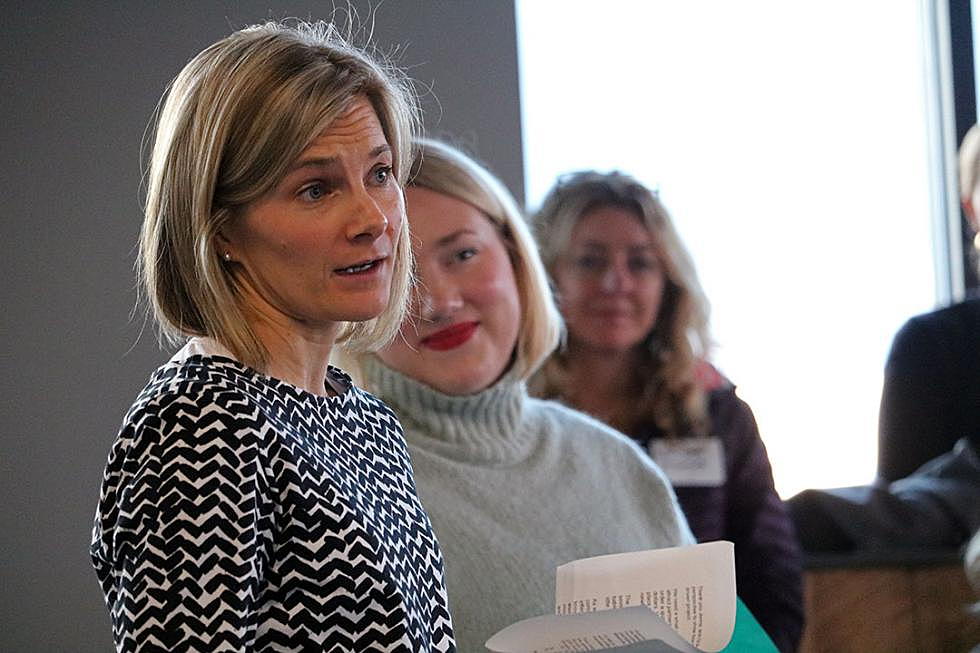
Debut event: Micro-fund pitch competition tests, rewards Missoula startups
Jenni Rohrbach and her partners at the Finlandia Foundation of Montana have a vision to provide “baby boxes” to new parents – a push to give infants of all backgrounds an equal start in life.
To get there, she told a room filled with micro investors, the Missoula nonprofit is looking to raise the money needed to provide safe sleeping spaces and essential clothing to newborns, and educate new parents on how to care for their infants.
It's all aimed at reducing infant mortality and creating healthy, happy families.
“We've already found a manufacturer from whom we can buy and order quality baby boxes with a mattress that costs less than $30,” said Rohrbach. “With $6,000, we can directly provide the first 200 babies a place to sleep that can be a life-saving gift. We've been talking to initial partners and with a little bit of micro funding, we can really get this project going.”
Montana Baby Boxes joined three other startups last week in Missoula's inaugural micro-fund pitch competition, held on the top floor of OnXmaps' new office building off Stephens Avenue.
Hosted by the Missoula Economic Partnership, Blackstone LaunchPad, and Hellgate and Goodwork venture networks, the debut event cut another notch in Missoula's startup scene. The 50 participants, many entrepreneurs in their own right, paid $5 to cast a vote for the evening's best pitch.
“A couple of years ago in Detroit, they created this micro funding initiative to create community buy in for nonprofit projects and entrepreneurship,” said Molly Cook, a graduate fellow with MEP who brought the concept to Missoula. “It spread to city's throughout the U.S., and we decided Missoula should get in on the game. This is our first time.”
With beer on tap, the evening raised $245 with the proceeds going to Missoula Works, an upstart employment and placement agency founded by Paige Pavalone. For the other competitors, the event presented an opportunity to hone their pitch to a roomful of seasoned entrepreneurs.
Michael Gill, CEO and founder of GSM, faced the room to detail his plans for a business assembling “electric hyper-sports cars.” The vehicles will be 3-D printed using state-of-the art technology and assembled in a Missoula manufacturing facility.
“We want to make a more sustainable vehicle, and we also love vehicles that go really fast,” Gill said. “I've assembled a team of engineers from all around the world. We're all cooperatively working together to develop a modular vehicle that will be 3-D printed.”
Gill said the plan would see the printer create the chassis and body panels. That, he said, gives the buyer the design freedom to create their own vehicle, so long as it adheres to state and federal law.
It's also a move away from the combustible engine, and Gill is sold on electric speed.
“We want to show people that electric cars are way more fun to drive that standard petrol,” he said. “We're going after the high-end market because we want to prove our concept with the people who have disposable income. After we've proven this concept on a modular high end, we intend to start extending it to a mass market as soon as the business can sustain that.”
Gill's concept brought a flurry of questions – how long does it take to print a vehicle, what expertise does he bring to the table, how does the licensing work, and what would he do with the proceeds if happened to win?
“Micro funding can help complete Phase One, the completion of a chassis on a modular design,” he said. “It's something that can help us get a physical location so we can get the rest of our licenses. It helps us get rolling, and that's what we really need.”
Jenni Graff, the economic development director at MEP, said the inaugural event received eight proposals, making it difficult to select the final four. She hopes to make the event a regular occurrence, though that could take some time to develop.
“We do hope to continue events like this, and we would love to see more involvement from the non-profit community and civic groups,” said Graff. “We wanted to put on this event in an effort to encourage entrepreneurial thought in all facets of our community, which is why the event was open to any idea that would improve our community.”
